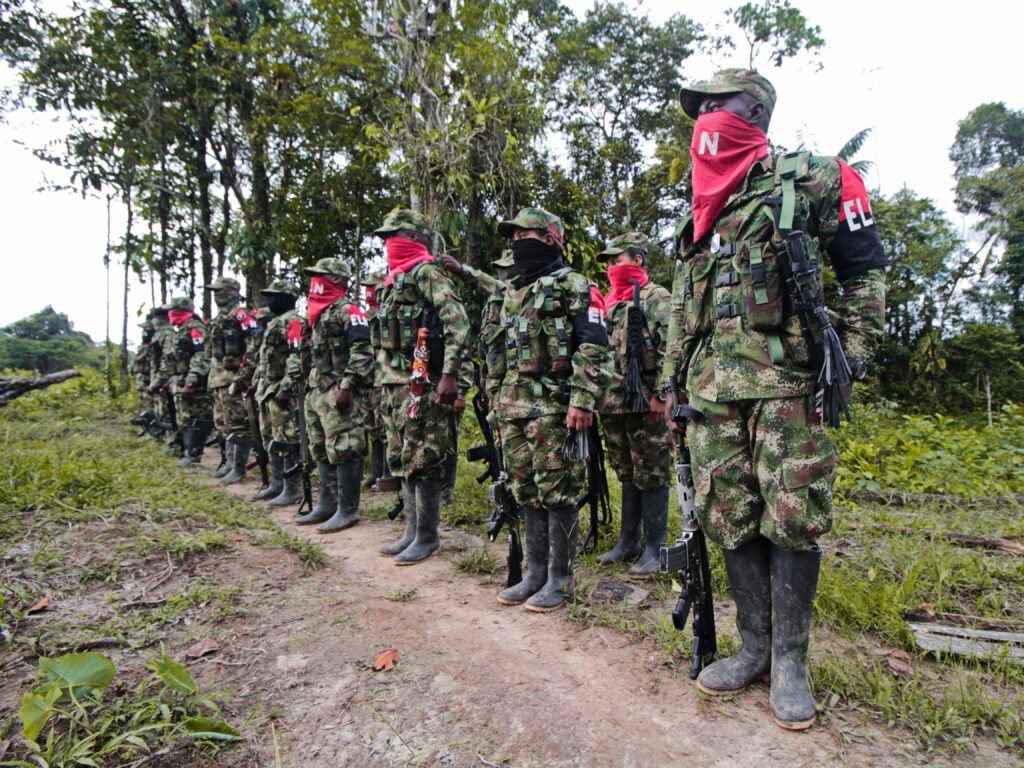
A 72-hour ‘paro armado’, or armed strike, by the National Liberation Army (ELN) began at midnight today in Colombia’s western Chocó department.
The armed group declared the action, which threatens attacks on anyone leaving their homes, following weeks of clashes with the Gaitanist Self-Defense Forces of Colombia (AGC), or Gulf Clan, that have displaced 3,400 and confined at least 9,200.
While the ELN claims that the strike is meant to raise awareness of the humanitarian crisis in Chocó, government officials accuse it of using the action as a cover to create a drug-smuggling corridor.
The ELN’s Western War Front announced the action in a comuniqué on Saturday, criticizing the government for being allied with the AGC (also referred to as EGC) and failing to address the ongoing crisis in Chocó.
“To make visible the entanglement between the state, military forces and mercenaries, we declare a 72 hour armed strike in the Chocó department,” read the statement.
During the action, residents of affected areas will be forced to remain in their homes and face a threat of violence if they leave.
Andres Preciado, Director of Conflict and Security at Fundación Ideas para la Paz, explained the impact of these measures.
“The most worrisome [element] is the humanitarian situation due to mobility restrictions, where communities are prevented from accessing food and other rights,” the analyst told The Bogotá Post.
Preciado also noted that the ELN tends to resort to armed strikes when a new wave of hostilities begins with the EGC.
The most recent bout of fighting between the ELN and EGC began on February 5 around Puerto Murillo, a remote town on the Río San Juan, which is a key cocaine smuggling route.
Preciado notes that the EGC has made significant territorial gains this month and believes the ELN is using the strike to slow its advance.
The ELN acknowledges that there has been a “paramilitary advance”, and claims that the Gulf Clan is working in collaboration with the state.
“We must unmask the plans of the oligarchy: the implementation of megaprojects, of their extractivist economic model and the massive arrival of mercenaries to protect their interest,” read the statement.
Preciado explained that it is difficult to determine if state collusion with the EGC is “systematic” or “opportunistic.”
But the analyst maintained that the group’s expansion in Chocó goes much deeper than whether or not it has received state support.
Although the violence in Chocó has reduced since early February, local authorities fear that new clashes could erupt at any moment.
Yesterday, the Ombudsman’s Office issued a warning about the deteriorating security situation in Colombia.
In a statement, it identified 11 flashpoints across the country involving 10 armed groups and stressed that the conflict in Chocó was particularly concerning.
“One of the most critical situations can be found in the subregion of San Juan, Chocó,” read the communiqué.
Speaking to W Radio, Iris Marín, Colombia’s Ombudsman, warned that members of the Estado Mayor Central, or Central General Staff, were in the Chocó for the first time.
The FARC dissident group is reportedly working alongside the EGC to fight the ELN.
The ELN staged a similar armed strike in November 2024 to reassert its control over the region and denounce state megaprojects. The strike lasted a week and forced some 50,000 people to remain in their homes.
Preciado believes that state security forces will not attempt to disrupt the strike.
“Once the strike is declared the damage has already been done, and the population is confined [to their homes] out of fear and a lack of confidence that the security forces can protect them,” said the analyst.
Feature image credit: Brasil de Fato via Flickr





